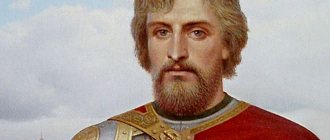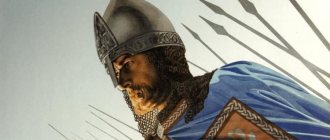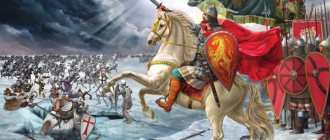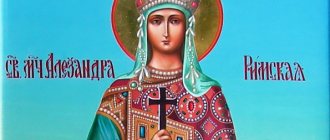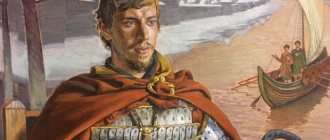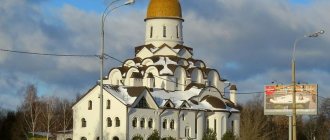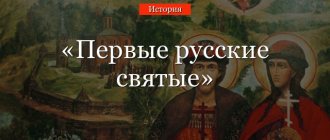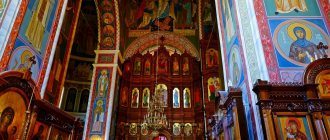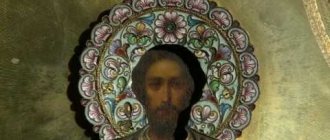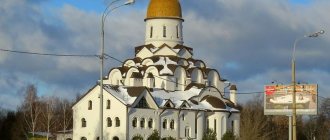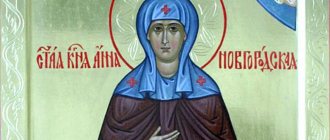Online reading of the book Life of Alexander Nevsky
The story of the life and courage of the blessed and Grand Duke Alexander
In the name of our Lord Jesus Christ, the son of God.
I, pitiful and sinful, narrow-minded, dare to describe the life of the holy Prince Alexander, son of Yaroslav, grandson of Vsevolodov. Since I heard from my fathers and myself witnessed his mature age, I was glad to tell about his holy, honest, and glorious life. But as the Tributary said [*]: “Wisdom will not enter an evil soul: for it dwells in elevated places, stands in the middle of the roads, and stops at the gates of noble people.” Although I am simple in mind, I will still begin by praying to the Holy Mother of God and trusting in the help of Holy Prince Alexander.
This Prince Alexander was born from a merciful, philanthropic, and most of all meek father, the Great Prince Yaroslav, and from his mother Theodosia [*]. As Isaiah the prophet said: “Thus says the Lord: “I appoint princes; they are sacred, and I lead them.” And truly, his reign was not without God’s command.
And he was handsome like no one else, and his voice was like a trumpet among the people, his face was like the face of Joseph, whom the Egyptian king made the second king in Egypt, and his strength was part of the strength of Samson, and God gave him the wisdom of Solomon, His courage is like that of the Roman king Vespasian, who conquered the entire land of Judea. One day he prepared to besiege the city of Joatapata, and the townspeople came out and defeated his army. And only Vespasian remained, and turned those who opposed him to the city, to the city gates, and laughed at his squad, and reproached them, saying: “They left me alone” [*]. Likewise, Prince Alexander won, but was invincible.
Once one of the eminent men of the Western country [*], from those who call themselves servants of God [*], came, wanting to see the maturity of his strength, as in ancient times the Queen of Sheba [*] came to Solomon, wanting to listen to his wise speeches . So this one, named Andreas [*], having seen Prince Alexander, returned to his people and said: “I went through countries and peoples and did not see such a king among kings, nor a prince among princes.”
Hearing about such valor of Prince Alexander, the king of the Roman country from the northern land [*] thought to himself: “I will go and conquer the land of Alexander.” And he gathered a great force, and filled many ships with his regiments, and moved with a huge army, blazing with the military spirit. And he came to the Neva, intoxicated with madness, and sent his ambassadors, proud, to Novgorod to Prince Alexander, saying: “If you can, defend yourself, for I am already here and ruining your land.”
Alexander, having heard such words, burned in his heart and entered the church of St. Sophia, and, falling on his knees before the altar, began to pray with tears: “Glorious God, righteous, great, strong God, eternal God, who created heaven and earth and set the boundaries You commanded the peoples to live without transgressing other people’s borders.” And, remembering the words of the prophet, he said: “Judge, Lord, those who have offended me and protect them from those who fight me, take a weapon and a shield and stand up to help me.”
And, having finished the prayer, he stood up and bowed to the archbishop. The archbishop was then Spyridon [*], he blessed him and released him. The prince, leaving the church, dried his tears and began to encourage his squad, saying: “God is not in power, but in truth. Let us remember the Songmaker, who said: “Some with weapons, and others on horses, we will call on the name of the Lord our God; They, defeated, fell, but we resisted and stand upright” [*]. Having said this, he went against the enemies with a small squad, not waiting for his large army, but trusting in the Holy Trinity.
It was sad to hear that his father, the great prince Yaroslav, did not know about the invasion of his son, dear Alexander, and he had no time to send news to his father, for the enemies were already approaching. Therefore, many Novgorodians did not have time to join, as the prince hurried to speak. And he came out against them on Sunday, July fifteenth, having great faith in the holy martyrs Boris and Gleb.
And there was one man, the elder of the land of Izhora [*], named Pelugiy, he was entrusted with the night watch at sea. He was baptized and lived among his family, the pagans, and his name was given in holy baptism Philip, and he lived godly, observing fasting on Wednesday and Friday, which is why God deigned him to see a wonderful vision on that day. Let's tell you briefly.
Having learned about the strength of the enemy, he went out to meet Prince Alexander to tell him about the enemy’s camps. He stood on the seashore, watching both routes, and spent the whole night without sleep. When the sun began to rise, he heard a strong noise on the sea and saw one nasad [*] floating on the sea, and standing in the middle of the nasad were the holy martyrs Boris and Gleb in red robes, holding their hands on each other’s shoulders. The rowers sat as if covered in darkness. Boris said:
“Brother Gleb, tell us to row, so we can help our relative Prince Alexander.” Seeing such a vision and hearing these words of the martyrs, Pelugius stood trembling until the attack disappeared from his eyes.
Soon after this, Alexander came, and Pelugius, joyfully meeting Prince Alexander, told him alone about the vision. The prince told him: “Don’t tell this to anyone.”
After that, Alexander hastened to attack the enemies at six o'clock in the afternoon, and there was a great slaughter with the Romans, and the prince killed countless numbers of them, and on the face of the king himself he left the mark of his sharp spear.
Six brave men, like him, from Alexander’s regiment showed themselves here.
The first one is named Gavrilo Oleksic. He attacked the auger [*] and, seeing the prince being dragged by the arms, rode all the way to the ship along the gangplank along which they were running with the prince, pursued by him. Then they grabbed Gavrila Oleksich and threw him off the gangplank along with his horse. But by God's mercy he emerged from the water unharmed, and again attacked them, and fought with the commander himself in the midst of their army.
The second, named Sbyslav Yakunovich, is from Novgorod. This one attacked their army many times and fought with one ax, having no fear in his soul; and many fell by his hand, and they marveled at his strength and courage.
The third - Yakov, a native of Polotsk, was a hunter for the prince. This one attacked the regiment with a sword, and the prince praised him.
The fourth is a Novgorodian named Mesha. This man on foot and his retinue attacked the ships and sank three ships.
The fifth is from the younger squad, named Sava. This one burst into the large royal golden-domed tent and cut down the tent pole. The Alexandrov regiments, seeing the fall of the tent, rejoiced.
The sixth is one of Alexander's servants, named Ratmir. This one fought on foot, and many enemies surrounded him. He fell from many wounds and died that way.
I heard all this from my master, Grand Duke Alexander, and from others who participated in this battle at that time.
There was a wondrous miracle at that time, as in the days of old under Hezekiah the king. When Sennacherib, the king of Assyria, came to Jerusalem, wanting to conquer the holy city of Jerusalem, an angel of the Lord suddenly appeared and killed one hundred and eighty-five thousand of the Assyrian army, and when they got up in the morning, they found only dead corpses [*]. This was the case after Alexandrov’s victory: when he defeated the king, on the opposite side of the Izhora River, where Alexandrov’s regiments could not pass, a countless number of those killed by the angel of the Lord were found here. Those who remained fled, and the corpses of their dead soldiers were thrown into ships and sank them into the sea. Prince Alexander returned in victory, praising and glorifying the name of his creator.
In the second year after Prince Alexander returned with victory, they again came from the Western Country and built a city on the land of Alexandrova [*]. Prince Alexander soon went and destroyed their city to the ground, and hanged them, some, took others with him, and, having pardoned others, released them, for he was immeasurably merciful.
After Alexandrova’s victory, when he defeated the king, in the third year, in winter, he went with great force to the land of Pskov, for the city of Pskov had already been taken by the Germans. And the Germans came to Lake Peipus, and Alexander met them, and prepared for battle, and they went against each other, and Lake Peipus was covered with many of these and other warriors. Alexander's father, Yaroslav, sent his younger brother Andrei with a large squad to help him. And Prince Alexander had many brave warriors, like King David in ancient times, strong and steadfast. So Alexander’s men were filled with the spirit of war, because their hearts were like the hearts of lions, and they exclaimed: “O our glorious prince! Now the time has come for us to lay down our heads for you.” Prince Alexander raised his hands to the sky and said: “Judge me, God, judge my quarrel with the unrighteous people and help me, Lord, as in ancient times he helped Moses overcome Amalek [*], and our great-grandfather Yaroslav the accursed Svyatopolk” [*].
It was then Saturday, and when the sun rose, the opponents met. And there was a cruel slaughter, and there was a crash from breaking spears and a ringing from the blows of swords, and it seemed that a frozen lake was moving, and no ice was visible, for it was covered with blood.
And I heard this from an eyewitness who told me that he saw the army of God in the air, coming to the aid of Alexander. And so he defeated the enemies with the help of God, and they fled, but Alexander cut them down, driving them as if through the air, and they had nowhere to hide. Here God glorified Alexander before all the regiments, like Joshua at Jericho [*]. And the one who said: “Let us capture Alexander,” God gave into the hands of Alexander. And there has never been an opponent worthy of him in battle. And Prince Alexander returned with a glorious victory, and there were many captives in his army, and they led barefoot next to the horses of those who call themselves “God’s knights.”
And when the prince approached the city of Pskov, the abbots and priests and all the people met him in front of the city with crosses, giving praise to God and glorifying the lord Prince Alexander, singing a song to him: “You, Lord, helped the meek David to defeat the foreigners and our faithful prince with the weapon of faith to liberate the city of Pskov from foreigners by the hand of Alexandrova.”
And Alexander said: “O ignorant Pskovites! If you forget this before the great-grandsons of Alexander, then you will become like the Jews, whom the Lord fed in the desert with manna from heaven and baked quails, but they forgot all this and their God, who delivered them from captivity in Egypt.”
And his name became famous in all countries, from the Khonuzh Sea and to the Ararat Mountains, and on the other side of the Varangian Sea [*] and to the great Rome.
At the same time, the Lithuanian people gained strength and began to plunder the Alexandrov possessions. He went out and beat them. One day he happened to go out against the enemies, and he defeated seven regiments in one ride and killed many of their princes, and took others prisoner; His servants, mocking, tied them to the tails of their horses. And from that time on they began to fear his name.
At the same time, there was a strong king in the eastern country [*], to whom God subjugated many nations from the east to the west. That king, having heard about such glory and courage of Alexander, sent ambassadors to him and said: “Alexander, do you know that God has conquered many nations to me. So, are you the only one who doesn’t want to submit to me? But if you want to save your land, then come to me quickly and you will see the glory of my kingdom.”
After the death of his father, Prince Alexander came to Vladimir in great strength. And his arrival was menacing, and news of him rushed to the mouth of the Volga. And the Moabite women [*] began to frighten their children, saying: “Here comes Alexander!”
Prince Alexander decided to go to the Tsar in the Horde, and Bishop Kirill blessed him. And King Batu saw him and was amazed, and said to his nobles: “They told me the truth, that there is no prince like him.” Having honored him with dignity, he released Alexander.
After this, Tsar Batu became angry with his younger brother Andrei and sent his governor Nevryuy to destroy the land of Suzdal [*]. After the devastation of the Suzdal land by Nevruy, the great Prince Alexander erected churches, rebuilt cities, and gathered dispersed people into their homes. Isaiah the prophet said about such people: “A good prince in countries is quiet, friendly, meek, humble - and thus he is like God.” Without being seduced by wealth, without forgetting the blood of the righteous, he judges orphans and widows with justice, is merciful, kind to his household and hospitable to those who come from foreign countries. God helps such people, for God does not love angels, but people, in his generosity he generously bestows and shows his mercy in the world.
God filled Alexander's land with wealth and glory, and God extended his days.
One day, ambassadors from the Pope came to him from great Rome [*] with the following words: “Our Pope says this: “We heard that you are a worthy and glorious prince and your land is great. That is why they sent to you the two smartest of the twelve cardinals - Agaldad and Gemont, so that you could listen to their speeches about the law of God."
Prince Alexander, having thought with his sages, wrote him the following answer: “From Adam to the flood, from the flood to the division of nations, from the confusion of nations to the beginning of Abraham, from Abraham to the passage of the Israelites through the sea, from the exodus of the children of Israel to the death of King David , from the beginning of the reign of Solomon to Augustus and to the birth of Christ, from the birth of Christ until his crucifixion and resurrection, from his resurrection and ascension into heaven until the reign of Constantine, from the beginning of the reign of Constantine to the first council and the seventh [*] - about everything We know this well, but we will not accept teaching from you.” They returned home.
And the days of his life multiplied in great glory, for he loved priests, and monks, and beggars, and he revered and listened to metropolitans and bishops as to Christ himself.
In those days there was great violence from non-believers; they persecuted Christians, forcing them to fight on their side. The great prince Alexander went to the king to pray for his people from this misfortune.
And he sent his son Dmitry to the Western countries, and sent all his regiments with him, and his close household members, saying to them:
“Serve my son as you serve me with all your life.” And Prince Dmitry went in great strength, and conquered the German land, and took the city of Yuryev, and returned to Novgorod with many prisoners and with great booty [*].
His father, Grand Duke Alexander, returned from the Horde from the Tsar and reached Nizhny Novgorod, and fell ill there, and, arriving in Gorodets, fell ill. Oh woe to you, poor man! How can you describe the death of your master! How will your eyes not fall out along with your tears! How can your heart not be torn out by the roots! For a man can leave his father, but he cannot leave a good master; If it were possible, I would go to the grave with him.
Having worked hard for God, he left the earthly kingdom and became a monk, for he had an immeasurable desire to take on the angelic image. God also vouchsafed him to accept a greater rank—schema. And so in peace he gave up his spirit to God in the month of November on the fourteenth day, in memory of the holy Apostle Philip.
Metropolitan Kirill said: “My children, know that the sun of the land of Suzdal has already set.” The priests and deacons, the monks, the poor and the rich and all the people exclaimed: “We are already perishing!”
The holy body of Alexander was carried to the city of Vladimir. The Metropolitan, the princes and boyars, and all the people, small and large, met him in Bogolyubovo with candles and censers. People crowded, trying to touch his holy body on his honest bed. There was a cry, a groan, and a cry like never before, even the earth shook. His body was laid in the Church of the Nativity of the Holy Theotokos, in the Great Archimandrite [*], on the 24th day of November, in memory of Holy Father Amphilochius.
There was a marvelous miracle then, worthy of memory. When his holy body was laid in the tomb, then Sebastian the Economist and Cyril the Metropolitan wanted to unclench his hand in order to enclose a spiritual letter [*]. He, as if alive, stretched out his hand and accepted the letter from the hand of the metropolitan. And confusion seized them, and they barely retreated from his tomb. Metropolitan and Housekeeper Sevastian announced this to everyone. Who wouldn’t be surprised by that miracle, because his body was dead, and it was brought from distant lands in winter.
First national hero
The definition included in this subtitle is used by many modern domestic writers. They emphasize the role of Alexander Nevsky in the unification of the Russian principalities, which before that were completely disunited and only fought among themselves. All this negatively affected the integrity of the borders of the entire state. Of course, true unification was still a long way off. But Nevsky took the first steps in this direction.
In particular, Lydia Obukhova’s novel “Alarm Morning” is dedicated to this. In this historical work, the author notes that although at that time there was no concept of a single country, Nevsky managed to make the fight against the German and Swedish invaders a national matter.
It must be admitted that in recent years a large number of novels have appeared that examine various alternative versions of the history of Ancient Rus'. For example, the significance of our hero’s personality is questioned by some authors. Connoisseurs of alternative history admit that Nevsky could have been an insignificant ruler who, in fact, did not play a decisive role in the Russian history of the 13th century.
Legend 5. And betrayed the Russian principalities
Verdict: This is not true.
Alexander Nevsky asks Batu Khan to spare Russia. Late 19th century Russian State Library
Alexander was cruel, but he can hardly be called a traitor who voluntarily went over to the service of the conquerors. The legend is that Batu Khan made the prince the “betrothed son” of A.K. Yugov. Warriors // Collected Works. In 4 vols. T. 3. M., 1985. and even the heir of the Golden Horde, is a fiction of the Soviet writer Alexei Yugov, author of the novel “Rators.” And the historian Lev Gumilyov claimed without evidence that Alexander even fraternized with the khan’s son Sartak.
One can come across the opinion that in 1252 Alexander went to the Horde with a complaint or denunciation against his brother Andrei - the consequence of this was precisely Nevryuy’s campaign. The historian Tatishchev wrote about this in the 18th century:
“Alexander complained about his brother, Grand Duke Andrei, as if he had seduced the khan, taking a great reign under him, as if he were the eldest, and gave him his father’s cities, and did not pay the khan in full for exits and tamgas.” “Alexander complained about his brother, Grand Duke Andrei. As if he had flattered Khan [Batu], he [Andrey] received the reign as the eldest. And he occupied his father’s cities, and did not pay the exits and tamgas [that is, taxes] to the khan in full.” Tatishchev V.N. Russian history. T. 5. M., L., 1965..
But it is difficult to trust this work: we do not know on what basis it was written. Moreover, there is nothing about this in other sources.
Like other princes, Alexander submitted to the khan's will, went to the Horde, paid tribute and received a label for reigning, that is, the right to rule the lands.. Relying on the Novgorod nobility, he forced the townspeople to submit to the Tatar census and the need to pay the khan. But he could not act differently, otherwise he would have had to flee, and the census (along with a punitive expedition) would have been carried out by a more accommodating prince.
15 questions about the Tatar-Mongol yoke
Who are the Tatar-Mongols, why is the Horde “golden” and what remains of it today
Vision
A night guard was sent to those places, led by the brave husband Pelugius. All night he did not close his eyes and suddenly heard the splashing and sound of water, and then he saw a floating boat, and on it stood the holy martyrs Boris and Gleb. They had a decent conversation, and the guard heard: “Brother Gleb, let’s help our relative Alexander!” Pelugy became numb and when he met the prince he told all this. For Alexander this was a great encouragement. And early in the morning the enemy fell. Six brave sons died from Alexander’s regiment: Gavrilo Oleksich, Sbyslav Yakunovich, Yakov, Mesha, Sava and Ratmir.
Their exploits are described in great detail in the story “The Life of Alexander Nevsky.” A summary in a diary can only describe some facts.
Legend 8. He won the Battle of the Ice because the Germans were in very heavy armor
Verdict: This is not true.
Battle on the Ice. Painting by Vladimir Serov. 1942 © Vladimir Serov / State Russian Museum
The equipment of a full-fledged equestrian warrior of that era (a knight of the Livonian Order or a princely warrior) was approximately the same, including in weight. Both heavily armed and lightly armed warriors fought on both sides.
In fact, victory was achieved due to competent tactical maneuver and distribution of forces. As a result, according to various German sources, several dozen German knights died on the battlefield or were captured - very large losses at that time.
Description and portrait of Prince Alexander
So, let’s turn to the text of the work “The Life of Alexander Nevsky”. The summary can immediately begin with a description of the prince himself, as in the original of this historical story. Alexander was born to a pious princely couple, Yaroslav and Feodosia. He was very handsome, his voice sounded like a trumpet, his face vaguely resembled the courageous face of Joseph, he had frantic strength, like Samson, he was wise, like Solomon, brave, like Vespasian, who conquered the entire land of Judea. So Alexander won and was not defeated.
Having learned about such a ruler, a nobleman named Andreas came to him from the Western country, who, having met him, said: “I have traveled through many countries and have not seen such a king among kings and a prince among princes.”
